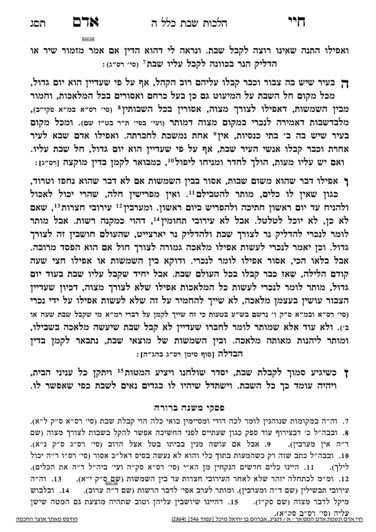We are continuing in siman 6, where the Chayei Adam is discussing that which is muttar and assur during bein hashmashos. We have learned that Chayei Adam holds amira l’achum is permitted, even on an issur deoraysa, provided there is a significant loss. However, if there is no significant loss, one may not perform amira l’achum.
The Chayei Adam clarifies that when he prohibits amira l’achum during bein hashmashos, he is referring to bein hashmashos and the 30 minutes before nightfall. He explains that throughout the world, we must assume the greater Jewish community has accepted Shabbos. So it is more chamur, and Amira l’achum is there assur. We are also not referring to when the community already accepted Shabbos, as we have learned previously that it is assur to do all melacha and Amira l’achum once the community has accepted Shabbos (S0119).
However, if an individual accepted Shabbos early, amira l’achum is muttar in all circumstances. One is also allowed to perform issurei derabanan if he is nechpaz vetarud, as we have learned (S0125). The Chayei Adam explains that since the Jewish community has not yet accepted Shabbos and is still performing melacha, this Jew is no worse, so he may ask a non-Jew to do melacha for him.
The Chayei Adam adds that similarly, amira l’yisroel is muttar as well. If a Jew does melacha for another Jew on Shabbos itself, it is often assur to benefit from it, but over here, since the other Jew has not yet accepted Shabbos, it is muttar to benefit from his melacha and even to ask him directly.
It is important to note that all of the cases of amira l’achum discussed until now regard asking a non-Jew directly to perform melacha. In some of the cases we learned in which amira l’achum is assur, it may be muttar if the Jew hints to the non-Jew. We will discuss these halachos further at a later time.
There is a concept of tosefes Shabbos on motzei Shabbos as well. The Mishnah Berurah brings an argument that since Shabbos is already in effect, there is no leniency during bein hashmashos of motzei Shabbos. On Friday night, when it is not yet Shabbos, one can be lenient on the safeik of bein hashmashos because the chazakah (current presumption) is that it is not Shabbos. However, on motzei Shabbos, the chazakah is that it is still currently Shabbos, so until we know with certainty that Shabbos is gone, we must assume it is still Shabbos. We will discuss whether there are leniencies regarding the bein hashmashos of motzei Shabbos in the halachos of havdalah.
Summary
- If one did not accept Shabbos early, during bein hashmashos, it is muttar to perform an issur derabanan for the purpose of a mitzvah or significant need, such a tevilas keilim.
- Amira l’achum is permitted, even on issurei deoraysa, during bein hashmashos, provided there is a significant loss. In these cases, one does not have to hint but may ask directly.
- If one was mosif on shabbos earlier in the day, he may do derabannons as mentioned above.
- He may ask a non-Jew to do any melacha, even without significant need.
- Amira l’yisroel is muttar on all issurim, if the Jew has not yet accepted Shabbos.
- Once an half hour before Shabbos is reached, this is no longer permitted. Then the Halacha will revert to the level of permission for bein hashmoshos.



